Convicted

Brief Synopsis
Cast & Crew
Henry Levin
Glenn Ford
Broderick Crawford
Millard Mitchell
Dorothy Malone
Carl Benton Reid
Film Details
Technical Specs

Synopsis
After a fight in a nightclub ends with the death of a prominent politician's son, Joe Hufford is arrested and charged with murder. Although the district attorney, George Knowland, advises Joe to hire a good criminal lawyer, Joe decides to stick with Vernon Bradley, the corporation lawyer sent by his employer. Knowland, who believes the death to be accidental, suggests that Bradley have Joe plead guilty to manslaughter. Bradley refuses and, after the case goes to trial, the lawyer's lack of experience in criminal law results in a guilty verdict for Joe, who is sent to prison. After six months, Joe joins a group of prisoners who are planning an escape. Joe's cellmate, Malloby, warns him that Ponti, one of the prisoners involved in the plan, had betrayed other convicts during an earlier attempt. Nonetheless, Joe is determined to escape to visit his ailing father. Before the escape, Joe learns that his father has died, and frustrated, starts a fight with a guard. Joe is sentenced to solitary confinement and thus misses the escape. As Malloby had predicted, Ponti reveals the escape plans to the prison authorities, and all the escapees are killed. Meanwhile, Knowland is given the job of prison warden. Ponti demands that Knowland save him from the angry convicts and release him from prison as Captain Douglas, the brutal head guard, had promised. Knowland agrees only to transfer him to another prison, and until that is possible, offers him a room in the warden's quarters. Knowland also takes an interest in Joe's case and has him transferred from the prison laundry to a position as his chauffeur. At Knowland's suggestion, his daughter Kay befriends Joe and tries to restore his dignity. Meanwhile, Malloby and some of the other convicts plot to kill Ponti. Malloby, who works as Knowland's butler, is to carry out the killing, but insists that Joe should not be involved. By accident, however, Joe is waiting for the warden in his office and sees Malloby leave the scene of the murder. When Joe will not reveal the name of the killer, Knowland warns him that he will be accused of the crime. Despite this threat, Joe continues to keep silent, and Knowland sends him to solitary confinement. After Joe is slipped a knife with which to kill Douglas, Malloby contrives to be sent to solitary and then uses the knife to kill Douglas in retaliation for returning him to prison for a minor parole violation. Before he is gunned down by the guards, Malloby confesses to Ponti's murder. Shortly after that, Joe is paroled and receives Knowland's permission to call on Kay after he finds employment.

Director

Henry Levin
Cast
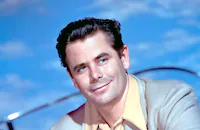
Glenn Ford
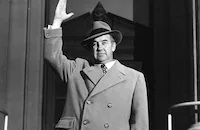
Broderick Crawford

Millard Mitchell

Dorothy Malone
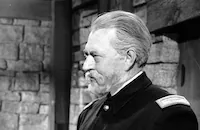
Carl Benton Reid
Frank Faylen

Will Geer

Martha Stewart
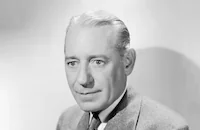
Henry O'neill

Douglas Kennedy

Roland Winters

Ed Begley
Frank Cady

John Doucette
Ilka Gruning
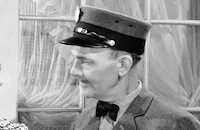
John A. Butler
Peter Virgo

Whit Bissell

Fred Sears
Fred Graham
Eddie Parker

James Millican

Ray Teal
Robert Malcolm
James Bush
Bill Tannen
Clancy Cooper
William E. Green
Charles Cane

Griff Barnett
William Vedder
Alphonse Martell
Harry Harvey
Marshall Bradford
Bradford Hatton
Jimmie Dodd
Benny Burt
Thomas Kingston
Jay Barney
Wilton Graff
Vincent Renno

Harry Cording
Richard Hale
Chuck Hamilton
Charles Sherlock
Crew
Carl Anderson
William Bowers
Jerry Bresler
Frederick Briskin
Al Clark
James Crowe
Lodge Cunningham
George Duning
Burnett Guffey
Seton I. Miller
Fred Niblo Jr.
Morris Stoloff

Photo Collections
Videos
Movie Clip




Film Details
Technical Specs

Articles
Convicted (1950)
Based on a popular 1929 play by Pulitzer Prize winner Martin Flavin, the basic story of Convicted was already a familiar one thanks to past screen versions in 1931 (by Howard Hawks as The Criminal Code, featuring the first big role for Boris Karloff) and again in 1938 (John Brahm's more obscure Penitentiary), plus alternate Spanish and French versions prepared in 1932 (Criminel and El codigo penal). The complicated set-up for Ford's character essentially boils down to his decision whether to adhere to the prison "code of silence," which requires a man to never snitch on another inmate even if he himself is set to take the punishment. While the prior versions were almost entirely concerned with this moral quandary and fit the template of pre-code crime films popularized by the likes of James Cagney, Convicted instead betrays the influence of film noir with its dank and shadowy visuals courtesy of director-for-hire Henry Levin and inventive cinematographer Burnett Guffey, a maestro of monochromatic imagery whose credits ranged from the masterful thriller My Name Is Julia Ross (1945) to major studio work with All the King's Men (1949), Nicholas Ray's In a Lonely Place (1950), From Here to Eternity (1953), and fascinating late-period noirs like Scandal Sheet and The Sniper (both 1952), The Strange One (1957), and Screaming Mimi (1958). Not surprisingly, he remained in demand until his retirement in 1971 and earned two Academy Awards, working on projects as diverse as Bonnie and Clyde (1967), Birdman of Alcatraz (1962), the wildly underappreciated How to Succeed in Business without Really Trying (1967), and even two 1961 assignments with cult favorite William Castle, Homicidal and Mr. Sardonicus.
Of course, the biggest commercial draw of Convicted was the opportunity to see the first teaming of all-American box office draws Glenn Ford and Broderick Crawford, who clicked so well they reunited again for Fritz Lang's 1954 noir, Human Desire, and the oddball 1956 western, The Fastest Gun Alive. A solid leading man since the World War II era riding high from his pair of 1946 hits, Gilda and A Stolen Life, Ford became an archetypal "American dad" type in a number of popular westerns, thrillers, and dramas, remaining busy well into the 1990s. Meanwhile Crawford had cultivated a more weather-beaten, take-no-guff persona able to deliver tricky and fast-paced dialogue. His smash stage success in Of Mice and Men in 1937 quickly translated to a film career peaking with an Academy Award as Best Actor for the aforementioned All the King's Men. In 1950 he also reversed audience expectations with his hilarious turn in Born Yesterday, solidifying a professional reputation he parlayed into many films, television programs and radio plays for the next four decades.
Among the colorful supporting cast featuring such familiar faces as Will Geer (later famous as Grandpa on The Waltons), Ed Begley and Whit Bissell, the showiest moments go to rising star Dorothy Malone, who was just beginning to prove herself as leading lady material. However, she wouldn't reach full mainstream acceptance until she earned an Oscar for mamboing her way into screen immortality in Douglas Sirk's immortal soap masterpiece, Written on the Wind (1956), a definite step up from the prior year's trauma of appearing as Liberace's love interest in Sincerely Yours. Malone teamed with Sirk again in 1958 for another satisfying heavy-breathing opus, The Tarnished Angels, but her film career soon fizzled out after a handful of memorable turns in the same year's trashy camp classic, Too Much, Too Soon, and 1960's much-neglected disaster epic, The Last Voyage. A life-threatening illness during her tenure on the 1960s soap opera Peyton Place and a subsequent lawsuit against the producers and studio further hampered any major future projects, though she did continue to pop up occasionally in TV guest star roles and eccentric exploitation films (The Day Time Ended [1980], The Being [1983]).
In an odd side note, a third name on this film carried over from All the King's Men: rising composer George Duning, one of the three uncredited composers on that film. His work was impressive enough to earn him solo scoring duties on Convicted, and his atmospheric work confirmed his promise with Columbia executives enough to propel him to the big time with two other films mentioned above, From Here to Eternity and Scandal Sheet, which earned enough prestige to keep him busy turning out melodies for all the major studios well into the 1980s.
Producer: Jerry Bresler
Director: Henry Levin
Screenplay: William Bowers, Seton I. Miller, Fred Niblo, Jr., Martin Flavin (play)
Cinematography: Burnett Guffey
Film Editing: Al Clark
Art Direction: Carl Anderson
Music: George Duning
Cast: Glenn Ford (Joe Hufford), Broderick Crawford (George Knowland), Millard Mitchell (Malloby), Dorothy Malone (Kay Knowland), Carl Benton Reid (Captain Douglas), Frank Faylen (Ponti).
BW-91m.
by Nathaniel Thompson

Convicted (1950)
11th Annual Noir City, Egyptian Theatre (Los Angeles) - A Report on the 11th Annual Noir City, Egyptian Theatre, Los Angeles, Part 1
Imagine if Out of the Past ended not with Jane Greer's death but with her capture. Imagine if she went to prison and was released on parole years later. And imagine if her parole officer was kindly blonde Virginia Huston, the one who played Robert Mitchum's good-girl lover in that film.... These thoughts came to mind at this screening because Greer's character in the second film is rather similar to that in the first, though she takes the cynicism to much more interesting and personal levels. She's still tough and contemptuous, but her inner shame and self-loathing at having turned out the way she has is equally clear -- and very compelling. Lizabeth Scott, meanwhile, looks, sounds, and behaves very much like Virginia Huston in Out of the Past. Not seeing Out of the Past right before this film, one might not notice the similarities, but seen together, they are striking.
If The Company She Keeps can be called "noir," it's in how Greer feels trapped by her former prison life. She is unable to function like a normal human being and is given to great paranoia. She feels everyone is judging her and thinks less of her because of her past. It's as if in her mind she's still in a noir movie where the world is out to get her, while in reality she is in a normal world that wants to help her. There is more of a plot, involving Greer stealing away Scott's reporter boyfriend (film noir fixture Dennis O'Keefe), but the film is really driven by Greer's character issues.
Greer is excellent in one of her best performances. Scott is fairly sexless and even lifeless in her role, all polished on the outside with little energy on the inside. She doesn't put up much of a fight when she learns her parolee is stealing away her man! The Company She Keeps is definitely worth a look, given the chance.
This viewer, alas, was unable to attend the three biggest rarities of the first festival weekend: Fly-By-Night (1942) from director Robert Siodmak, and two obscure Fox pictures, Roses are Red (1947) and Smooth as Silk (1946). But I was able to catch another: Six Bridges to Cross (1955), a Universal title shown in a newly struck 35mm print. It's not a noir in any way, shape or form, and it's rather talky and flatly directed by Joseph Pevney, but it's notable for Tony Curtis's strong, very affecting performance and also for Sal Mineo's big-screen debut, which is excellent.
Mineo plays the child version of Curtis' character in a tale that spans the Depression era to the modern day (1950s), following the evolving relationship between a Boston cop (George Nader), who works his way up in the force, and a Boston street kid (Mineo), who grows up to be a criminal played by Curtis. Their friendship waxes and wanes over the years. Nader likes Curtis (as everyone does) and tries to help him stay on the straight and narrow, but then gets fed up when Curtis doesn't stay true to his new path and falls back into his old patterns.
Co-starring as Nader's wife is Julie Adams, who was there at the screening and was interviewed afterwards on stage. Adams is spry and energetic at 82, still a working actress, and she had only general memories of Six Bridges to Cross, which she hadn't seen since its release.
The picture was largely filmed in Boston, relatively unusual for a movie of this era, and the locations provide a freshness to a just-OK narrative. Ultimately, the performances of Mineo and Curtis are the best reasons to stick with the film; Curtis in particular, with his hyper desperation, seems to be giving a hint of things to come in Sweet Smell of Success (1957), in which he would deliver perhaps the performance of his career as Sidney Falco.
Convicted
The prison noir Convicted (1950) is the kind of movie one loves to discover at this annual festival of film noir. It's no masterpiece but simply a tough, compelling, well-acted film that is relatively obscure but was presented here in a sharp new 35mm print. Let's just say Convicted goes down real easy.
The third American film version of a 1929 Martin Flavin play (the first two were The Criminal Code [1931] and Penitentiary [1938]), Convicted stars Glenn Ford as a war veteran who accidentally kills a man who was harassing a girl at a nightclub. Ford slugs him but the guy hits his head in the fall and dies. Everyone knows it was an accident, including prosecutor Broderick Crawford, who tries hard to present the case in court in such a way that he will lose and Ford will walk. But Ford's inexperienced and idiotic lawyer blows the case, and Ford is convicted and given a 1-10 year prison term.
After a few years, Ford is still in prison, and Crawford reenters the story as the new prison warden, who moves to the facility with his kind-hearted daughter (Dorothy Malone). As Crawford tries again to help Ford, other inmates plan a breakout and then a murder of another prisoner who ratted on them. Ultimately, Ford must choose whether to give up information that could help set him free but would also break the code of silence all the inmates live by.
What makes Convicted a film noir are the two psychological qualities that mark most noirs: fatalism and alienation. For the first half of the movie, Ford is a classic noir victim of fate -- punished unjustly for a crime he did not commit (or in this case, not to the degree indicated). The world seems out to give him tough breaks for no apparent reason other than that's what the world is like. But then in the second half, when it becomes clear that he will indeed pretty soon get out of prison, the main thrust of his character changes to alienation. He knows he'll be out soon, but who will hire an ex-con? What will he do and where will he go? Suddenly the world just looks uncaring and hopeless.
Such subject matter gives Convicted the opportunity for greatness and profundity, but for that a better director than the mediocre Henry Levin would have been needed. A better filmmaker would have concentrated more on the fatalism of Ford's situation and his ensuing despondence. He would have kept the focus much more on Ford rather than allowing the story to drift into other side plots.
Still, Convicted is good stuff. Much credit has to be given to screenwriter Bill Bowers (one of three credited writers), whose razor-sharp tough-guy talk and flair for comedy writing is unmistakable. His touch is evident from the very opening scene of two detectives humorously arguing over present and past ballplayers, newspapers, and the like. (Their exchange plays like a model for the dialogue in Quentin Tarantino's Pulp Fiction [1994].) Later, when inmate Millard Mitchell tries to dissuade another prisoner from breaking out, he says, in an obvious and vivid Bowers line: "I've seen it before. They bust out eager and come back dead."
Bowers' dialogue and fast-moving story suit Broderick Crawford well, who displays his full no-nonsense persona. Ford, too, delivers one of his usual and excellent studies in quiet fury. He was always good at showing rage behind a calm façade, and Convicted is a good vehicle for him.
With an enjoyable supporting cast of Millard Mitchell, Frank Faylen, Will Geer, Whit Bissell, and Ed Begley, Convicted delivers the goods. If only the intensity of Ford's story had been allowed to develop more oomph!
by Jeremy Arnold
11th Annual Noir City, Egyptian Theatre (Los Angeles) - A Report on the 11th Annual Noir City, Egyptian Theatre, Los Angeles, Part 1
Quotes
That was a double breasted, overstuffed idiot.- George Knowland
A first year law clerk could win this case with an IQ of 50.- George Knowland
You don't have to do anything to help me. Just go down and talk to the guards and find out what it's all about. I'd do that much for you. I'd do that much for a dog.- Ponti
I've got to get to the bottom of this or they'll bust me wide open.- George Knowland
Trivia
Notes
The film's working title was One Way Out. Martin Flavin's play was the basis for two earlier Columbia films. In 1931, Howard Hawks directed The Criminal Code, which starred Walter Huston. Penitentiary, released in 1938, was directed by John Brahm and starred Walter Connolly (see AFI Catalog of Feature Films, 1931-40; F3.0876 and F3.3412).














